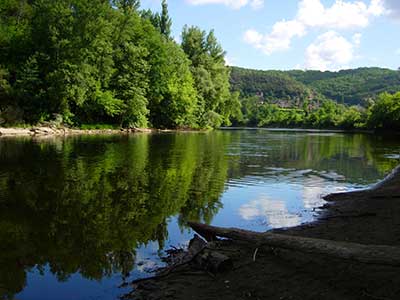Find out about The Open University's Open qualifications
 River Dordogne in France Perigord
In his essay ‘Of Cannibals’, first published in 1580, the French writer Michel de Montaigne noted that his local river, the Dordogne, had in twenty years eroded its right bank and taken over so much land that the foundations of houses were destroyed. It is later in the same essay that Montaigne reflected on the Americas, unknown to Europe until Christopher Columbus’s landing there in 1492, and criticised the tendency to judge other cultures negatively, stating that ‘everyone gives the title of barbarism to everything that is not in use in his own country’. For Montaigne, thinking about how his local environment was changing was related to thinking about the wider world, about people on the other side of the globe.
River Dordogne in France Perigord
In his essay ‘Of Cannibals’, first published in 1580, the French writer Michel de Montaigne noted that his local river, the Dordogne, had in twenty years eroded its right bank and taken over so much land that the foundations of houses were destroyed. It is later in the same essay that Montaigne reflected on the Americas, unknown to Europe until Christopher Columbus’s landing there in 1492, and criticised the tendency to judge other cultures negatively, stating that ‘everyone gives the title of barbarism to everything that is not in use in his own country’. For Montaigne, thinking about how his local environment was changing was related to thinking about the wider world, about people on the other side of the globe.
I thought about how little attention I pay to the natural world around me. I doubted that I’d notice any changes in my local river, but knew that I’d spot a new café opening next to it.
When I first read about the changing course of the Dordogne in Montaigne’s essay, I went on a different mental journey. I thought about how little attention I pay to the natural world around me. I doubted that I’d notice any changes in my local river, but knew that I’d spot a new café opening next to it. I suspect I’m not the only one. Like over half of the world’s population, I live in a city. Shops and cars dominate my urban environment. But sitting indoors reading got me thinking about Montaigne’s river in France, about the river just ten minutes from where I live, and about my disconnect from nature.
 Reading could encourage empathy towards nature
Studies have shown that reading stories can increase our empathy, reduce prejudice and persuade us of something. Could books also prompt us to take more notice of the environment? Authors have always expressed environmental concerns in their writing. A flood provides the climax to George Eliot’s The Mill on the Floss (1860). The first paragraph of Margery Allingham’s crime novel The Tiger in the Smoke (1952) introduces the smog that hides the killer as he makes his murderous way around the city: ‘The fog was like a saffron blanket soaked in ice-water. It had hung over London all day and at last, was beginning to descend.’
Reading could encourage empathy towards nature
Studies have shown that reading stories can increase our empathy, reduce prejudice and persuade us of something. Could books also prompt us to take more notice of the environment? Authors have always expressed environmental concerns in their writing. A flood provides the climax to George Eliot’s The Mill on the Floss (1860). The first paragraph of Margery Allingham’s crime novel The Tiger in the Smoke (1952) introduces the smog that hides the killer as he makes his murderous way around the city: ‘The fog was like a saffron blanket soaked in ice-water. It had hung over London all day and at last, was beginning to descend.’
More recently, a new genre of climate fiction has emerged. Jenny Offill’s Weather (2020) captures the narrator’s anxieties about environmental catastrophe. The High House (2021) by Jessie Greengrass is about a climate scientist. Niall Bourke’s Line (2021) engages with the related refugee and climate crises.
Within literary studies, scholars working in the domain of ecocriticism investigate how the environment is represented in literature. As ecological concerns have grown, there has been an increasing need to reconsider the ethics of how humans interact with the world and what we might do to avoid climate breakdown. Stories can help to do that. Whether it’s the reflections on animal rights in Olga Tokarczuk’s Drive Your Plow Over the Bones of the Dead (2009), the setting of a future drought-ridden California in Alexandra Kleeman’s Something New Under the Sun (2021), or Montaigne’s observation on the Dordogne, literature has the power to take us away from our personal concerns by introducing us to the perspectives of the earth and animals, as well as other people in different parts of the globe.
Of course, major action by the international community is needed to address the climate crisis. But when one million plastic bottles are bought every minute we can all certainly do our bit on an individual level to make our lifestyles more sustainable and change our consumption patterns so that businesses and governments have to adapt. We are more likely to do something if we feel it is important. Reading books might just make us more sensitive to humanity’s place in a fragile world, to the interconnectedness of nature and humankind, and accordingly, inspire us to change.
 Click on the banner to explore the COP26 hub
Click on the banner to explore the COP26 hub



Rate and Review
Rate this article
Review this article
Log into OpenLearn to leave reviews and join in the conversation.
Article reviews